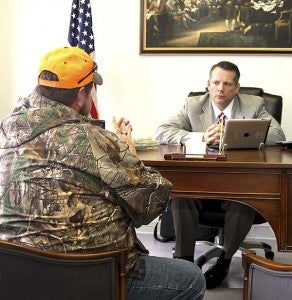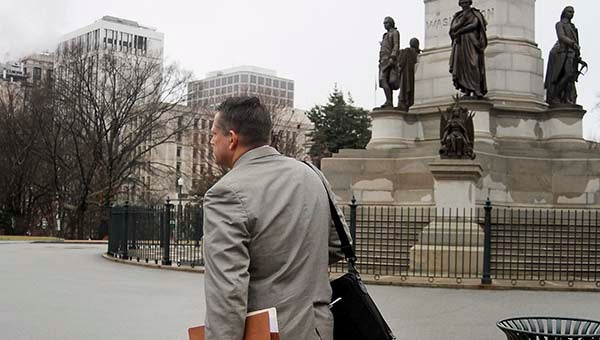Elected representatives find little time to sit still when General Assembly is in session
Published 12:18 pm Saturday, February 22, 2014

Del. Rick Morris listens to Billy Barcroft of Isle of Wight County regarding a bill that has to do with trapping foxes. — CAIN MADDEN | TIDEWATER NEWS
RICHMOND—To be at the Virginia State Capitol is to be in the presence of a generator. Even as a visitor, one can feel the energy from the moment you walk into either the Capitol or the nearby representatives’ office building when the General Assembly is in session. There’s a palpable sense of activity as people move with purpose. You hear a constant hum of activity coming from delegates, senators, and aides talking with one another or on their phones.
One of the numerous representatives who contributes to that force is Del. Richard “Rick” L. Morris (R-64). His district includes parts of Franklin and Suffolk, as well as the counties of Isle of Wight, Prince George, Southampton, Surry and Sussex.
On Feb. 5, this reporter and Managing Editor Cain Madden of The Tidewater News were permitted to follow the delegate for a day and gain a sense of what’s involved during an average day when the General Assembly is in session.
For starters, Morris had already been in a lengthy committee meeting since 7 a.m. on the day we met him at a little past 10 a.m. Between our appointment time and when he was finally released from duty, a delegation from Southampton County government and another from Paul D. Camp Community College had come to the GA office as well.
The first group was in to see Del. Roslyn Tyler (D-75) about her bill, House Bill 62, which has to do with the county being able to collect fees for disposing of solid waste. Southampton County Administrator Mike Johnson and Supervisors Ronnie West and Bruce Phillips also dropped by Morris’s office in the hopes of saying hello. The second group was making the rounds of delegates to promote community colleges.
Within a minute or so of the delegate’s arrival, the three of us were off to the House Appropriations Subcommittee on General Government and Capital Overlay, where he was to present his HB510.
That legislation would have kept future governors or other state officials from accepting federal money unless the General Assembly approves and defines what’s offered and how the funds are to be used.
“Would have,” because Morris said just before our entering the room, “HB510 has no chance of surviving.”
We wait several minutes as other delegates spoke regarding another bill about eugenics. Morris studied his notes for the presentation. But the time draws closer for our pre-arranged meeting with Speaker of the Virginia House of Delegates William J. Howell (R-28). Morris informs the committee that he would be back to present his bill.
Moving quickly down to Howell’s office, there’s time to catch our collective breath. Morris continues to review notes or check his phone; Cain sends some texts, and I strike up a conversation with a woman who’s apparently leading a contingent of women devoted to the Equal Rights Amendment. They, too, were seeking an audience with the Speaker.
The moment arrives and Howell welcomes us with a smile and an invitation to be seated. Knowing there’s only a few minutes available, I asked him about his challenges and successes in the GA so far.
He first points out that 27 percent of all bills come from the Courts of Justice committee, which is one of Morris’ responsibilities. Howell takes a moment to praise the delegate for his work.
Issues of K-12 grade reform, mental health and transportation are foremost in the Speaker’s mind this term. He goes on to explain part of his responsibility is being a referee for other delegates.
“You always have to deal with 99 other elected officials. When they get their feelings hurt or angry, I’m dealing with them on a one-on-one basis,” said Howell.
“I try to put the fires out,” he continued, and added that he’s found Morris to be “very well adjusted.”
“I love Virginia,” continued the Speaker. “It’s a great opportunity of ours [to serve]. It’s the best job.” He acknowledged, though, that the representatives are “on call 24 hours.”
The state level of government is preferable to him than the federal side. While the latter is well intentioned, Howell said, it’s been gridlocked for the past decade or two.
“So much more can be done at the state level and on a part-time basis,” he said.
Howell also noted that Morris has “been very busy” with the Courts committee, which has in his opinion, “a lot of good thinkers.” The Ethics Subcommittee is another of the delegate’s responsibilities; Howell mentioned that he used to be its chairman.
The Morning Hour, which is when delegates come together for discussion and voting, has what the Speaker calls “healthy debates and fun to watch.”
That remark’s proven true starting at noon.
Words of thanks are quickly exchanged and we’re ushered out the door and back to the previous subcommittee.
“We got more time than I thought we would,” Morris remarked after leaving.
His turn before the panel comes soon after arriving, and the delegate states his case.
“I firmly believe if we’re taking additional money, the people should vote on that,” he said, adding that an exception could be made for student loans.
Ultimately, though, the subcommittee tables the matter; the bill was left in Appropriations by Feb. 12. On the way out, Morris explained that a bill almost always has to be presented twice before making progress.
Then it’s back to his office on the eighth-floor. The Virginia Library can be seen across the street on the right; the Hotel John Marshall in the distance at the left.
Someone comes in to speak briefly with Morris, oblivious to Cain and me. A few minutes later, we’re downstairs to the ground floor and making our way to the Capitol.
A soup tent is on the way, but the delegate said lunch will have to wait. Gov. Terry McAuliffe is there talking with other people, but there was no time to stop even for a photo.
A jacket is found for Cain and we’re escorted to our places on the floor of the House. Truly a thrill. The energy’s still there and grows as delegates make their way in steadily. Pages either await them or are on the move for the representatives. Several even bring lunch. At noon, the Morning Hour begins and Speaker Howell is standing at his place overlooking the assembly.
Recognitions are made of guests seated above; a long list of bills is reviewed, debated and voted on; this lasted to 2:45 p.m.
During that session, Cain and I made time for a quick lunch. A television broadcasts the assembly in a cafeteria. No sooner had we finished than everyone was dismissed. Dashing back to the House, Morris has not only already gone, but was already back in his office by the time we make our way upstairs.
He leads us to the first of three committee meetings left on his day’s agenda. Cain and I decide to stay just for a short while, before heading back home. Goodbyes and thanks you are said on parting.
We faced a 1-1/2 hour drive. Morris said later he didn’t finish until about 9:30 p.m.
Then he had to get back early the next day and start again.
But there are no complaints.
He’s there to serve and accepts the demands.
During a phone interview several days after the visit, the delegate had some time to speak at length about the extra work he took on when he first pledged the oath of office in 2012.
Balance is key, said Morris.
“It’s not easy at all. There are a lot of extra hours. Then you do your regular job,” he said. “It’s a challenge.”
Active for 22 years in the Navy, Morris has his own law firm that deals with military law and clearance issues. He spends all Saturday at the office in the Southside, and Sunday’s with his family in Carrollton.
“I try to do as much as I can on each of the jobs,” added Morris. “You have to be prepared beforehand. There’s prep work that goes before that [committee meetings.] That’s for everybody. That’s just the nature of the business.”
As one might expect when it comes to creating and moving a bill along to become law, there are many steps involved, including subcommittee hearings, committee hearings, and votes before it can arrive on the House floor for debate and a decision.
“Some issues take much more time than others,” he said.
Speaking of which, Morris is especially interested in his HB1084, which had just passed a Senate committee on Tuesday. This bill, he said, would provide “an avenue for citizens to fight back when local governments get too aggressive” when it comes to property rights.
A couple of weeks ago, the bill passed the House 88-7, and a Senate committee 13-2.
“Who’s going to argue helping people keep property rights?
“Our country is turning down the wrong direction,” Morris said. “I don’t see my role to expand government, but to protect individual liberties and freedoms. I’m a strong advocate of law enforcement, but not for unchecked access to privacy. Sometimes there’s some headbutting.”
Asked how the Republicans and Democrats of the House are getting along this term, Morris said that the atmosphere depends on whatever is the issue at the time.
For example, the expansion of the Affordable Care Act and Medicaid.
“I truly believe we need reforms,” he said. “There’s not a safety net to catch people defrauding the system. We’ve got to put some checks in there. Our state, we can’t afford it.”
The delegate also noted that Medicaid takes up 23 percent of the state budget, and to expand the program could require cuts.
“What are we going to cut out of the budget,” he asked. “Teachers? Public safety?
“The Democrats have their perspective,” Morris continued. “There’s a couple of Republicans who favor expansion without reform. But generally, Republicans want reform before expansion. The Democrats want the expansion. We’re at two different ends.”
Even once the GA dismisses for the term, Morris remains on the go, go, go.
“There are meetings almost every night – Ruritans, Rotary, Kiwanis, PTAs, from Suffolk to Prince George. Hardly a day goes by that there’s not something to do,” he said.
“If I can, I try to help everybody I can. Sometimes I can’t, but I can point them in the right direction.”
He asks that when people approach him with a concern, that they clearly state what’s at issue. When asked, let Morris know with whom you have already contacted or spoken. The delegate stressed that service is his motivation for balancing family, work and the GA.
“You feel like you’re doing some good,” Morris said. “A desire to help others is the reason I ran. It sounds corny, but it’s really true.”










